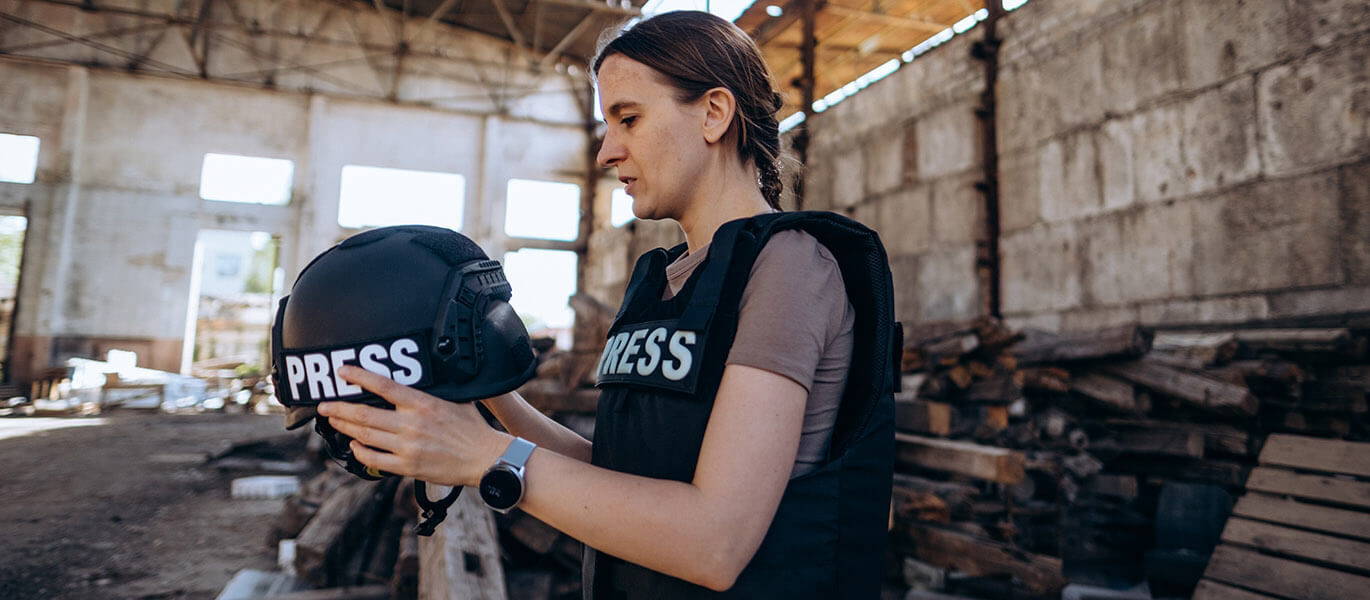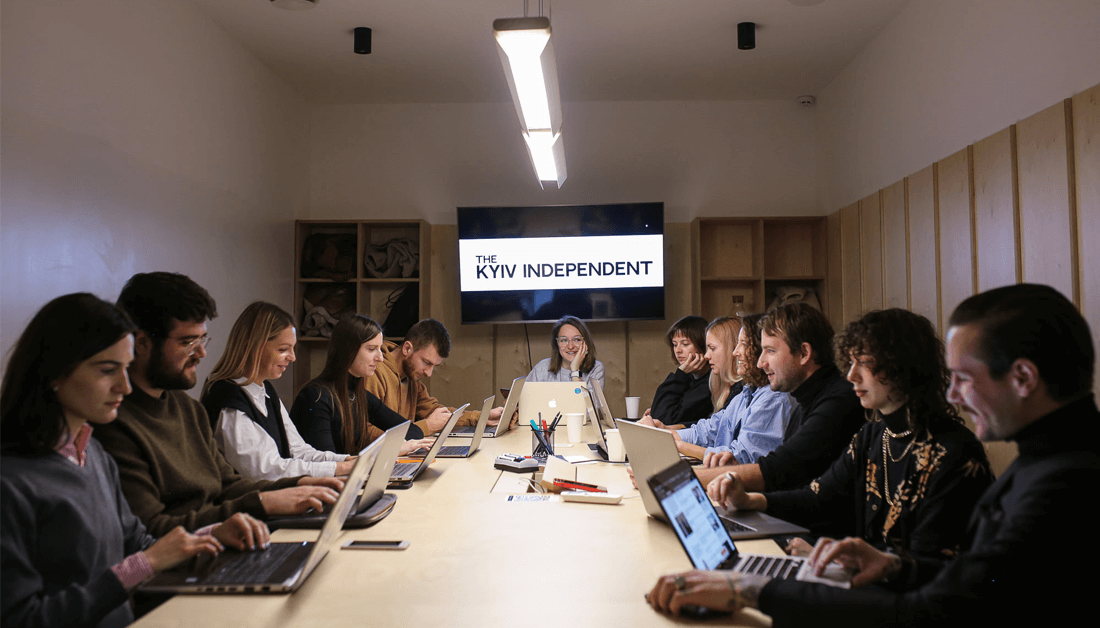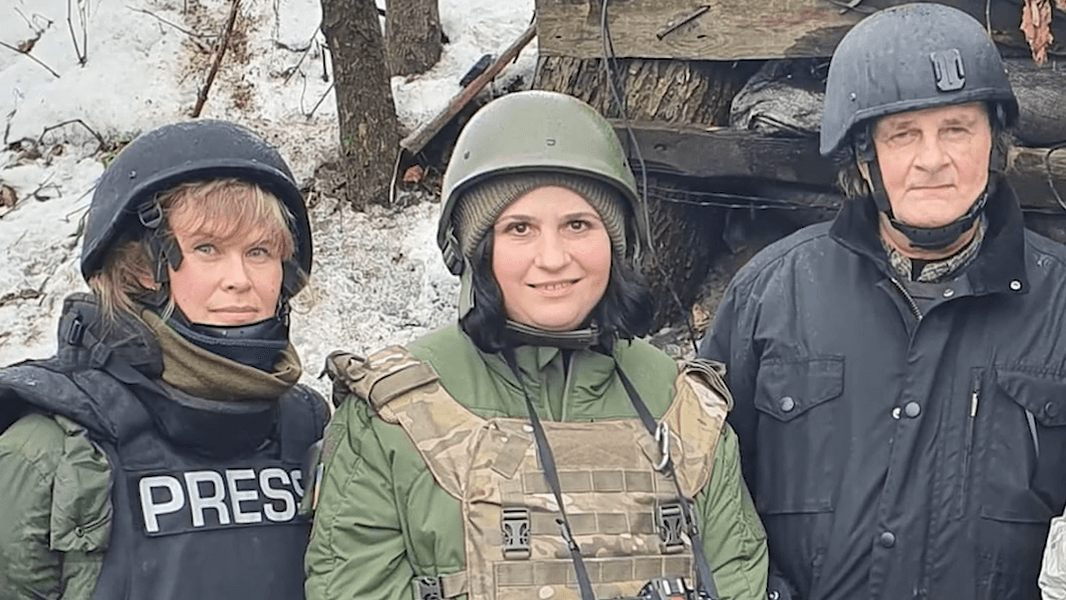- 34 media organisations received equipment to help them work in blackout conditions ranging from diesel power generators to charging stations to power banks for mobile phones and laptops.
- 425 safety equipment items sent to journalists in Ukraine by IMS with a total value of DKK 1,058,482:
- 50 sets of body armor in small size for women journalists, 25 sets of body armor in large size for men journalists.
- 50 helmets in small sizes for women journalists, 25 sets of helmets in large size for men journalists.
- 50 gas masks and 100 velcro patches.
- Six media development organisations supported by IMS to provide emergency assistance to media workers.
- 16 individual journalists financially supported.
- 67 media outlets supported by IMS since the war started:
- 21 strategic media outlets supported directly by IMS.
- 46 regional media outlets supported via micro-grants distributed by IMS’ strategic partners, i.e. UMBA and Lviv Media Forum.
- DKK 811,934 worth of technical equipment was bought and sent by IMS to the Ukrainian public service broadcaster Suspilne.
- IMS supported La Strada Ukraine, a public human rights organisation, in raising awareness among journalists about gender-based violence in the context of the war in Ukraine. This project will include the running of thematic webinars as well as support to journalists with information materials with recommendations and guidance.
- Following the adoption of the new Media Law in March 2022, a project with Centre for Democracy and Rule of Law (CEDEM) aimed to educate Ukrainian journalists, foreign journalists, media representatives, Ukrainian regulatory body in the media field, media lawyers, non-government organisations (NGO) and others, on the new media legislation, its practical usage and correct implementation, and to provide beneficiaries with knowledge on preventing the Media Law violations.
- Together with Souspilnist Foundation is collaborating with newsrooms to expand platforms for professional psychological support for Ukrainian journalists who have worked or are working with traumatic content related to the war. This involves the implementation of systematic programmes, including components such as diagnosis, training, psychological support and recovery. The project has already been rolled out to two newsrooms, with a third participating as of July 2023.
- In 2023, IMS began contributing support to Filter, the national media literacy project of the Ministry of Culture and Information Policy, which was launched in 2021.
How we work in Ukraine

IMS' current Ukraine programme began in 2020 as part of the New Democracy Fund. While IMS' original ambitions had been to strengthen civil society partnerships in Ukraine, the scope of the programme changed dramatically following Russia's invasion in February 2022.
IMS continues to work with our partners in Ukraine to provide the public with access to reliable information. Journalists and independent media outlets, particularly in times of war, are critical guarantors of the flow of independent, trustworthy news and information. What we have seen so far is that this war is certainly also an information war. All efforts must be made to ensure that the Ukrainian and international public can access reliable information.
How IMS is supporting journalists and media in Ukraine
How you can support media and journalists in Ukraine
Donations will go to keeping journalists safe (e.g. through equipment and training) and to ensuring that Ukrainian independent media and factcheckers can continue to operate. We will also push global players to protect the free word and combat fake news.
Media hub in Ukraine creates community among journalists and provides emergency shelter
The Lviv Media Hub, opened by Lviv Media Forum with support from IMS, provides Ukrainian and international journalists with a safe space to work during the war.
Get assistance
For media outlets
The New Democracy Fund’s Flexible Response Mechanism provides rapid financial and capacity development support on a rolling basis to civil society organisations, including media, in Ukraine as well as Belarus, Georgia, Moldova, Armenia and Azerbaijan.
For journalists
The Safety Fund provides immediate support for journalists who are victimised as a direct result of their journalistic work.
The support is made possible through donations made by members of the Danish Union of Journalists and is used in cases where:
- A journalist has been killed or rendered otherwise incapable of sustaining their family.
- A journalist is in need of immediate protection as a result of a direct threat (relocation, safe houses, evacuation out of the country or region).
- Urgent legal or medical assistance is required.
Fighting disinformation
Tech for Democracy
Under the Tech for Democracy initiative, the Danish Ministry of Foreign Affairs and IMS have facilitated a dialogue on war and disinformation in Ukraine to enhance and strengthen the urgent and continued collaboration between relevant stakeholdersto support free and independent journalism. The first of these rountables took place on 3 March 2022.
Participants have included Ukrainian government representatives, Ukrainian journalists and the broader Ukrainian civil society as well as representatives from Google, Meta, Microsoft, and Twitter, with more Big Tech companies slated to participate in 2023.
The focus of the discussions throughout past roundtables and working-level meetings has been on ways to best deal with disinformation, deliver pro-active solutions to protect high-quality journalism and ensure tracking and impact assessment among stakeholders.
Objectives for this multi-stakeholder collaboration include:
- Efficient and proportionate measures that curb disinformation while respecting human rights.
- Proactive solutions supporting and amplifying quality journalism, factchecking and quality information.
- Sharing and implementing insights and solutions at regional and global levels.
Helping young people identify disinformation
The IMS-funded campaign “Antithesis – We can’t be fooled!”, implemented by Souspilnist Foundation, united media professionals, bloggers, artists and representatives of youth organisations with over 100 participants. A special Antithesis/Anti-disinformation programme section was launched on Radio NV. Its 53 episodes were heard by over 3.5 million listeners during the three months they were aired.
The specially-formed youth band Combat Mosquitoes created music tracks and videos to address the issue of disinformation and the importance of countering it alongside propaganda and fake news. The pieces had 75,000+ views on Facebook in the first month and 30,000+ views on YouTube by the end of 2022.
A series of video materials were introduced, making critical thinking a fashionable cultural youth trend. A regional youth tour was held to create products (audio and video tracks). In the first month, the video “Anti-fake dog” was viewed over 1 million times by the youth audience on TikTok with 100,000 engagements.
Strengthening ethical journalism in Ukraine
Commission on Journalism Ethics
Following Russia’s full-scale invasion of Ukraine, Ukrainian Commission on Journalism Ethics applied to IMS with the request to support activities needed to help journalists to cover war and comply with ethical standards. Many Ukrainian journalists became war correspondents overnight, and it was necessary to help journalits learn how to report on this topic and provide the Ukrainian people with life-saving information.
With IMS’ support, CJE operated an ethics hotline, providing fast answers to nearly 100 requests. Additionally, CJE created and distributed the “Guide for journalists on the specifics on covering the war in compliance with the Code of Ethics”. They were also able to create and distribute useful visualisations on ethics.
Emergency safety work for journalists in Ukraine
IMS’ work on the safety of journalists in Ukraine is guided by the framework of the UN Plan of Action on the Safety of Journalists and the Issue of Impunity. The efforts include providing protective gear and facilitating dialogues between journalists on the ground and Big Tech
The Ukrainian Investigative Journalists Conference
The Ukrainian Investigative Journalists Conference was held in Truskavets, Ukrain, on 29–30 November 2022. It was the 14th flagship event which brought together the best investigative jouralists from Ukraine, Eastern Europe and the rest of the world. IMS is one the leading partners and supporters of the event, which is organised by one of IMS’ strategic partners in Ukraine, ІРРП – Інститут розвитку регіональної преси (RPDI).
The topic of the conference was “WARVISION: from investigating corruption to recording war crimes.” The discussions focused on how Russia’s full-scale invasion changed investigative journalism, whether it was easy to move from the usual formats to identifying Russian war criminals and how to respond to the challenges media are facing because of war.
Gohar Khodjayan, IMS’ Team Lead for Eastern Europe country programmes, provided a welcome speech to participants from Ukraine and abroad who made the trip to share their experiences, words of support and to find solutions to problem issues. Together with other IMS partners from Armenia, Georgia, Moldova and Ukraine, she participated in a panel discussion dedicated to gender and investigations in which the focus was on the newly created Women Investigation Journalism Network and result of a year-and-a-half of work in the region.
Personal accounts of the war
The Kyiv Independent
Ukrainian online outlet the Kyiv Independent began reporting on the war from day one of Russia’s invasion. As their staff learned to become war correspondents overnight – while dealing with the personal ramifications of the war – they also became the English-language voice of Ukraine.
Overarching: Gender equality in and through the media
- IMS has gender mainstreamed all project and strategic documents guiding our intervention in Ukraine. All support provided to the media is disaggregated by gender and a log is used for tracking who benefits from the support.
- IMS is also providing thematic gender support. IMS is working with and is in the process of issuing a contract with the Women’s rights organisation called La Strada and Women in media NGO on a project on media coverage of gender-based violence (GBV). This is inspired by our work on UN resolution 1325 on women, peace, and security through the media, which has been funded by the Norwegian Ministry of Foreign Affairs.
-
A report by IMS partner Detector Media focused on the relationship between gendered disinformation and the Russian social media propaganda machine, analysing Ukrainian and Russian segments of social networks to find out how pro-Russian users portray Ukrainian women. One of the key insights is that the propaganda is working to discredit Ukrainian women by painting them as frivolous women unconcerned with the fate of Ukraine.
- IMS is the only organisation in Ukraine providing safety equipment gear in small sizes, which are often difficult for women journalists to access as they are normally produced in larger sizes only.
- IMS is actively looking for new partnerships with, i.e., LGBTQ+ organisations and those working with marginalised communities and its intersection with media.
- IMS is also in dialogue with partners on supporting an investigation of GBV in Ukraine.
“Everything we know about war we know with ‘a man’s voice’”, and Ukraine is no exception
International media have taken on the unfortunate role in promoting hyper-masculine war narratives, gender stereotypes and manifestations of racism.





